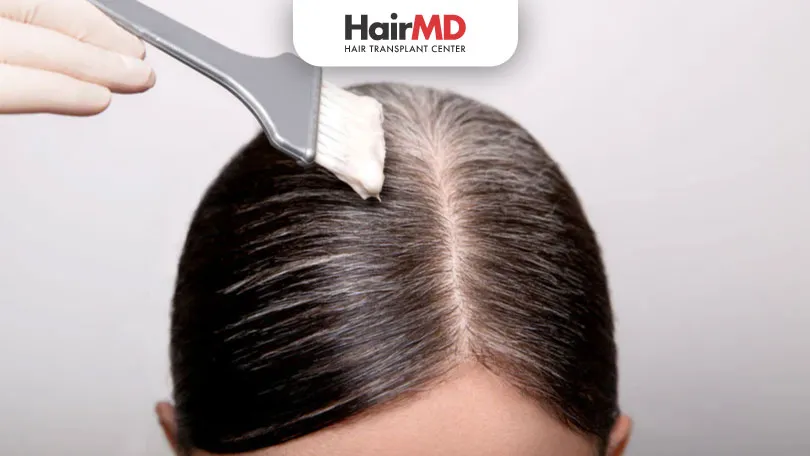31st Oct, 2022

Hair shedding is a normal part of the hair growth cycle, which includes three phases: growth, rest, and shedding. However, external factors like hair coloring can sometimes trigger excessive hair fall, leading to noticeable hair thinning or even permanent hair loss. Hair dyes can weaken the hair, causing it to break or fall out more easily. But does hair color truly cause hair loss?
If you’re curious about how hair coloring impacts your hair’s health and want to understand the connection, keep reading this blog for detailed insights and helpful tips to protect your hair.
What’s covered in the article?
- Does Hair Colour Cause Hair Loss?
- How to Prevent Hair Loss from Hair Colour?
- Conclusion
Does Hair Colour Cause Hair Loss?
Hair colouring in no way promotes hair growth; however, several types of colouring methods can make hair brittle, dry and prone to breaking. Below are the reasons that explain how hair colour and hair loss are related.
Hair Loss Due to Bleach
Hair bleaching products contain peroxide in large quantities which facilitates turning darker hair colour to blonde shade. The hair shaft is weakened by peroxide as it attacks the basal protein backbone, damaging the hair, making it brittle, and ultimately causing excessive hair fall.
Chemicals in Hair Dye Causing Hair Loss
Hair Dyes contain chemicals that make hair loosen from the follicle. The main chemicals responsible are ammonia and hydrogen peroxide, leading to hair loss.
PPD in hair dye is a major allergen leading to allergic reactions on the scalp and leading to severe hair loss in predisposed people.
Hair Weakening Due to Frequent Colouring
Hair colour frequently can make hair get thinner and weaker. Hair becomes dry, brittle and easily breakable.
Mastering All About Hair Color: जानिए प्रकार, side effects & Tips After Coloring -HairMD, Pune
How to Prevent Hair Loss from Hair Colour?
Hair dye has certain ill effects on our hair. Some of them are mentioned below:
- Stinging or burning sensations on the scalp, face, or neck, blisters or welts (occurs in individuals allergic to any component of hair dye)
- Itching or swelling of the scalp
- Swollen eyelids, lips, hands, or feet
- Red rashes all over the body
However, hair loss due to hair colouring can be reversed. Follow the following points to prevent hair loss and keep hair healthy after dying.
Avoid Bleaching Hair
Do not lighten your colour’s shade by bleaching, as it makes your hair weak and easy to break.
Use Ammonia-free Dyes
Many hair colours contain ammonia which is an alkaline chemical and is responsible for damaging your hair. Hair colour damage can be prevented by using ammonia-free natural dyes for healthy hair.
Go for Semi-permanent Hair Colouring
Semi-permanent hair colours are less damaging to hair because they are free of ammonia and peroxide. They do not have permanent effects and keep hair from loss.
Add Protein to the Mixture
Go for conditioning hair dyes available in the market. These proteins (often keratin) work to add nutrients back into the hair while the cuticle is vulnerable to the colouring process. This reduces harm done to your hair and may leave your hair feeling more soft, shiny, and healthy.”
Take care of your Coloured Hair
Coloured hair needs special care. Use a shampoo and conditioner designed for colour-treated hair. “Haircare doesn’t end at the salon so if you are using hair dyes, use the hair care products accordingly.
If you observe extensive hair loss after hair colour, then get an appointment with an expert dermatologist for a proper evaluation and treatment.
Do You Know?
Nearly 250 Patients Visit HairMD
Everyday For Various Hair Concerns?
(Your journey to healthier and fuller hair starts here!)
Meet Our Dermatologists
Conclusion
In conclusion, while hair colouring can lead to hair damage and even hair loss, there are ways to minimize the risk. Opt for ammonia-free dyes, avoid bleaching, and choose semi-permanent options to protect your hair. Additionally, taking proper care of your coloured hair with the right products is essential. If you notice excessive hair loss, consulting a dermatologist can help manage the situation and prevent further damage.
Further Reading
Top Kitchen Ingredients to Boost Hair Growth
Discover the best kitchen ingredients for hair growth! Use coconut oil, onion juice, aloe vera & more to nourish your hair naturally and reduce hair fall.
How to use Minoxidil and Dermaroller together?
Boost hair growth with Minoxidil & Dermaroller! Learn the right technique, benefits, and mistakes to avoid for thicker, healthier hair.
Powerful Home Remedies for Itchy Scalp
Soothe an itchy scalp naturally with home remedies like aloe vera, coconut oil, and apple cider vinegar. Discover simple solutions for scalp relief.
Omega-3 for Hair Growth: Benefits and Side Effects
Omega-3 nourishes hair, promotes growth, and reduces hair fall. Know its benefits, side effects, and best sources for healthy, stronger hair.
Have thoughts? Please let us know
We are committed not only to treating you, but also educating you.











